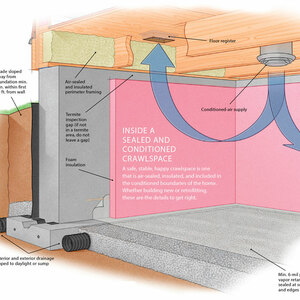Is it appropriate to call yourself a Carpenter even if you do not have Journeyman status? If that is how you earn your living is that not ‘carpenter’ enough. Did Jesus have a ticket? Who benefits from the apprenticeship program these days anyway besides the schools and the big construction companies and the text book publishers and c’mon it’s not rocket science anyway. Anyone have an opinion on this?
Discussion Forum
Discussion Forum
Up Next
Video Shorts
Featured Story

Fine Homebuilding is excited to be the official media partner of the 2024 Building Science Symposium series! This event offers builders, tradesmen, architects, designers and suppliers to discuss topics ranging…
Highlights
"I have learned so much thanks to the searchable articles on the FHB website. I can confidently say that I expect to be a life-long subscriber." - M.K.

















Replies
There is something to be gained through every journey....even if only a new perspective. Value? It's individual isn't it.
No
Have a good day
Cliffy
It took 4 yrs. of union apprenticeship before you got your journeyman card when I started out many moons ago. I still think it takes about 4 yrs. to get up to speed, although I called myself a carpenter from day one because...that's what I was! With the demise of the unions, education has become much more self-directed. Hence the value of a website like this. Despite my gripes about FHB, they do carry the torch of construction education. In fact, come to think of it, its only when they veer from the path of education into the path of info-tainment (what some have called "eye-candy") that I take exception.
One of my old bosses was a contractor with no hands-on building experience whatsoever, and he was always fond of saying "its not rocket scientry." (sic) This from a guy who couldn't build a dog house! I had an art teacher long ago who used to say "The person who doesn't know, doesn't know that he doesn't know!"
Jesus didn't have a "ticket". He did have hands-on carpentry training from his youth on, from his foster-father Joseph. No doubt a lot more than 4 years worth. In that culture most education, trade and otherwise, took place on the home level. But education was highly valued nonetheless, in the highly literate Hebrew culture, and by the time he was 12 Jesus was able to converse intelligently with the religious teachers at the temple.
He could no doubt have made an impressive career in carpentry, but dropped it as a vocation at the age of 30, when, following his baptism, he chose teaching/preaching as his new career. In three and a half years as a teacher/preacher, he made more impact on human society than any man before or since, and set forth a teaching so powerful it is impacting human lives down to our day.
H.G. Wells said “In the reign of Tiberius Caesar a great teacher arose out of Judea who was to liberate the intense realization of the righteousness and unchallengeable oneness of God, and of man’s moral obligation to God…This was Jesus of Nazareth…Is it any wonder that to this day the Galilean is too much for our small hearts.” Pretty strong endoresement from a man who was not himself a Christian!
Edited 1/20/2006 10:14 am by Huck
I just turned 30! Coincidence?
I just turned 30! Coincidence?>>>>>>>
No more than me being a HinJew carp : )The secret of Zen in two words is, "Not always so"!
When we meet, we say, Namaste'..it means..I honor the place in you where the entire universe resides, I honor the place in you of love, of light, of truth, of peace. I honor the place within you where if you are in that place in you and I am in that place in me, there is only one of us.
"its not rocket scientry."
years ago ... I was working a job for a surgeon( not brain). He had a bad habit of reacting to my change order prices by saying ... "it's not brain surgery" ...
after hearing that once too often ... I replied ... "Yeah, it's not. Every time a brain surgeon cuts open a head ... they see the same brain ... in the same place ... each time. Remodeling is different ... it's harder ... everytime I cut open a wall I never know what I'll find inside ..."
years later ... I told that to the smartest customer I ever worked for. An ER Doc ...
he laughed for days ... told me I was right too! Said "us" remodeling guys ... him and me ... had it all over the specialists!
Jeff Buck Construction
Artistry In Carpentry
Pittsburgh Pa
preach on, brother.
Weve done this before. Then it was called master carpenter. It got kinda wild.
arguements.
Yours is simpler I think,.....
Some of you are truly carpenters alone. Mostly here its just another jig in the library of talents. Then there are the specialists . I could go on. The truth is that no one ever ends training . The lawyer says he practices law and Ive often wondered why others dont say it including the carpenters. Say that and watch the response you get.
I practice the building trades. Sound funny ? Its a truer statement than carpenter for me.
Anyway doesnt journeyman mean you are able to do the work with out supervision?
Tim
about supervision...i would say technically you are right...and also if one's work must pass a government inspection and said work does indeed pass would that not also be enough for most people? Oh well...labels and credentials are basically the way North Americans judge one another...because it is certainly not based on merit or goodwill or compassion...
Isn't "government inspection" an oxymoron???
"Inspection" implying knowledge of the trade or specs and,
"government" Implying ahhhh welll errrr maybe Unaccountability???
Mr. T.
There's a steering-wheel in me pants and it's driving me nuts!!!
maybe your right but they are the ones in charge
" said work does indeed pass would that not also be enough for most people? "Who are MOST people and why do you care?Are you trying to get hired on a union job? A nom-union job? Working for the general public? Trying to impress the jobless bums at the bar?Unlike a few proffession such a physican, atternory, and engineer I don't know of any states where it is illegal to call yourself anything that you want including a carpenter.
most people meaning the paying customers
Its not just unions that use the terms.
The mechanical trades use it to idenify specific work . Codes have the terms in them . A journeyman can not bid work but he can "run" the work. He may be the lowly sparky or he could be the supervisior in charge . No offense meant. As long as the job has one journeyman in some instances they can get by with 3 and 4 year aprentices pulling he load.
The terms are used in billing systems for charges specifying differences and break downs for labor.
In bid work a company has different pay scales related to training and it is business practice to separate skills in payment . Thus the idea to only staff a job with as few as possible journeymans.
Im my travels as an inspector I met the work force in person. Many times apprentices had enough experience to be a journeyman but lacked the credentails which might be your problem. Sometimes those people came from states that were non union shop and were fully trained to handle the jobs but elected to go through the schools for maybe a better future. Many states are not recipatory with others licensing with out a test at least. Many can do the work but cant pass the test, so they remain maxed out apprentices. The comanies use them as near journeymans as they can but dont pay them as such.
I have a friend that does commercial painting and drywall and has to leave the state he lives in because he cant pass the state contractors test. Hes tried three times and failed it . Hes very successfull. He remains a scab in this state .
We could talk about it all day but thats the system. You would want a doctor or lawyer certified wouldnt you? Same thing.
Tim
it's not really the same thing because a doctor or lawyer can actually decide your FATE, which is probably more important than building housed stairs.
"it's not really the same thing because a doctor or lawyer can actually decide your FATE, which is probably more important than building housed stairs."
Unless those stairs fail, sending you crashing into the basement, where you break your neck and die!
With few exceptions, what anyone does can impact your life. Every part in the play matters...Buic
well in your world school bus drivers must make millions
Edited 1/20/2006 3:43 pm ET by huddledmass
No, but a school bus driver with the fate of 50 children in his hands is as important as any doctor or lawyer, IMO...Buic
PS - and they should make more then the minimum that most do.
Two things RE: the doctor analogy:
1) As was stated before, an MD has a bit more clout in determining your fate than a carpenter.
2) Yes I would want my doctor or lawyer satisfied, but that is far different than saying that the government should do the certifying or that certification should be required for someone to pay you for your services. Utlimately consumers should make the decision about who they want to build/wire/plumb their house.
Ultimately consumers should make the decision about who they want to build/wire/plumb their house
Yep, and who is the first to cry for government intervention when that new deck collapses, the poop backs up, or the house burns down because of faulty wiring?
It is the function of government to do for the governed, that which they can not do for themselves.
In the building and construction of public and private structures it is pretty much given that unless there are some enforceable standards, bad things happen. That is not to say that JM certifications and licensing requirements are guaranties that bad work will not be done, but that those that do meet the requirements have minimum knowledge of their trade.
In some states you can get general liability insurance by just calling yourself a builder, but I don't know of any that will allow you to call yourself a JM plumber, electrician, or HVAC without some type of certification.
HOs can assume any risk they want to in many places, but local and state codes must still be met. Once they offer themselves for hire, the rules change. The government and insurance companies enter the equation and protect us from ourselves.
Dave
I have no qualms with standards - they wouldn't necessarily have to be gov't standards, but I really don't have a beef with that. The inspection process makes sense to me.
Insurance companies, banks etc. would have every right to refuse financing or coverage if they felt the individuals didn't have certification if that was their preference, but why should it matter to the government who builds the structure provided it meets code?
If the inspector can see that the guy is incompetent, he doesn't have to pass it.
"If the inspector can see that the guy is incompetent, he doesn't have to pass it."
The other side of the fence .
An inspector cant catch it all and even if they could thats a lot of job you mention.
BIs dont judge quality only written code.
I told a plumber one time , your job passes inspection but it looks like sht. That afternoon I got a repremand from the state inspector. Its not our job to judge he said . If it were it would be in the codes. I replied it did look like sht and I didnt lie about that but it wasnt my job.
All an inspector can do is try but they can not see whats with in somtimes .
Tim
On the flip side though, a piece of paper doesn't make someone a quality carpenter, electrictian, plumber whatever. Obviously inspectors can't catch everything.
IMO, word of mouth is the best way to tell who does quality work or not. Do the people who issue state certifications go look at a persons past work to see if he's worthy of certification or not? - not to mention how would he have done that work to get certified anyway.
I'm not saying that certification should be thrown out, just that making a state REQUIREMENT is unnecessary & restricts access to the field & hence competition. Certification can certainly be something an individual could advertise, private entities such as banks & insurance companies would be free to refuse to finance or insure jobs that aren't done by certified personel if they wish.
Certification is a deep subject for inspections and their purposes.
Electrical and plumbing in the gas section can deal with life or death issues. Of course HVAC deals with the same . Supply water deals with building damage and public health . Waste waters deal with public health and sanitation from raw gases and bacteria. Most all codes are fire realted and the heaviest reason from the code stand point is life , not building damage. Thats a very very short sumary and in no way meant to catch it all in a post. Ill also mention though that people have been sick for a long time and can eventually lose their life through different gases. Bob could pick up here and preach a sermon.
So its a big deal that technicians be properly trained and then certified. Of course Im dealing now with mechanical only in this answer .
Let the public do somthing and there will be plenty to abuse it . Theres enough lifes lost by simply homeowners not knowing any better . People who are not properly trained are in the same class . I wish you could have rode with me for a week and saw the abortions that could have cost someones life. Ive walked into residences and gas odor was strong enough for me to quickly exit but they didnt know . Ive inspected operationg commercial buildings with a steady flow of people and had to shut some down because of gases. Id tell you some of the worst that I ever saw but that would require more space than I have here. I will tell you I worried every single night that I might have missed somthing that might cause loss of life. All I can say is its a heavy burden and I dont miss it .
Contractor licensing is not about how to but financial ability. The codes dont address the concerns of this thread . Ive often wondered why but the building official has to catch it dealing with untrained people sometimes and thats a pain in the butt dealing with someone whose never even read a code book so you can imagine the fun.
Tim
Not rocket science? Talk to Joe Bartock. Take a look at his calcs, then tell us that its not. I think Joe is a rocket scientist.
The CM
He is clearly an exception whoever he is...and whatever he is doing probably has very little place on a job site, unless he is drafting Frank O. Gehry's latest project
When someone says 'journeyman', to me a certain amount depends on whether they mean a union certification, or a state/provincial certification....certainly in Canada we do have certifications at the provincial and interprovincial level....my understanding is most of the states also still have a system for qualifying as a journeyman on the books, even if it is not in use.
In Canada, we also have trades that are compulsory....you have to be a journeyman or apprentice to follow that trade so it also acts as a license (electrician, plumber, mechanic, etc....varies by province), and trades where certification is voluntary (carpenter and cabinetmaker are voluntary in most provinces as far as I know, although the carpenters in a lot of places would like to see it made a compulsory trade. Public saftety I think is the main criteria for making a certification compulsory.
Out of the 170 or so designated trades in Canada, 45 or so are 'Red Seal' or interprovincial...you are licensed in your home province, but the certification is recognised as equivalent by all the other provinces. For example, I have an Industrial Woodworker ticket that is only good in Ontario, but my Nova Scotia Red Seal cabinetmaker ticket means I'm a cabinetmaker in every province.
Some of the advantages that I see in a provinical/interprovincial system are that everyone undergoes a fairly standardised basic training in the theoretical aspect of their trade, combined with on the job expereince......everyone has to pass a standardised test that proves they have a certain knowledge of the trade. That helps with job mobility....if we move, employers know we have had the same training as their apprentices or journeymen. It also helps to establish fair pay rates for people with different levels of experience (althoug this can be a problem too....I know there are people who have been third year apprentices for years, because as an apprentice they work year round....as a journeyman, they get less work). In Canada, apprentices earn while they learn.....90% of the training is on the job, and they get funded for the in-school portion. My experience of how schools provid the training across Canada has been very positive....I've met a lot of amzing people who are very passionate about providing good training.
This system is not perfect, and it does not guarantee that everyone with a certification is a genius or a 'master' whatever....but it tends to produce a consistent and well trained workforce. Most of the tradespeople I work with are very proud of their tickets, and what they went through to get it. I worked hard for mine. I also know people that are excellent tradespeople that do not have a certification.
On the union certification side...I know several very good people that are strong in the carpenters union (some of the other unions too)....the union provides very good training, but I know they have issues in getting people to take advantage of it. I personally have knowledge of several abuses in the journeyman certification process. .. one guy I worked with in Ontario claimed he got his journeyman status after a day or so (he started as a 3rd year apprentice, got his ticket the next day), because his company had a job with a utlity that required everyone to be a journeyman.
One of my guys joined the union this week to qualify for a job he had lined up......he wrote the test and passed, so he is a journeyman.....there was some math, but he didn't have a calculator, so they waived that. He has some background in carpentry, but I wouldn't call him a carpenter. He told me the test 'was not very hard'. So I'm not sure how much credibility I give that certification. I know for a fact there are good tradesmen in the unions, and I've worked alongside them.....I also know there are some that are barely capable.
Sorry this is long....anyway, to the question, I for one care, and am proud to be able to call myself a journeyman.Cabinetmaker/college woodworking instructor. Cape Breton, Nova Scotia.
Is it appropriate to call yourself a Carpenter even if you do not have Journeyman status?
Depends on three things, near as I can tell.
First, is there a legal description for JM in the area where you work?
Second, are there union rules on job description in your area?
Thirdly, barring either of the previous two, are you qualified to carry the designation you are giving yourself?
This is an area of tough sledding. Not just legal issues but philosophical ones as well.
I could pass the exam portions of either a Electrician's or Plumbers JM as prescribed by the State of Texas (could probably scrape by for Master in Plumbing except for the new NG attachments). That does not make me a qualified plumber or electrician, either in my mind, or in the view of the State of Texas.
I know a thing or two about carpentry, from timbering, to framing, to finish work, to mill and case work (and some furniture, come to cases)--yet, I am not a "real" carpenter. There are far better framers out there, far more skilled carpenters, too.
Oddly enough, the State of Texas has no opinion on what would define a professional carpenter, despite being the actual artisan who creates the structural shell of a large number of habitable buildings.
Do I know more about carpentry than say, a 21 year-old, hard-charger, wanting JM wages? I might--I've been swinging a hammer longer than he's been alive. But, then again, BlueEyedDevil has forgotten more about framing than I've ever known, and hase the photos to prove it.
As some of the other posts have suggested, it may have more to do with what is within you.
Unless you are just looking for JM pay with only helper/apprentice experience--that's another thing altogether.
not really looking for JM pay because i am not quite that arrogant and i do have huge respect for the guys that have gone the educational, bureaucratic distance....but i have been in the trade for 6 years and all i am looking for is a living wage for my hard work. I don't think $20 canadian is too much to ask for. That works out to be $40000 a year or about $31000 US per year....no benefits.
looking for JM pay because i am not quite that arrogant
Sorry, I had to check, there are those out there long on confidence and short on experience. Which can be vexing when you get to the point that you know that what you don't know is what seems to define too much of what you do.
Now, as a guess, you may have to "vote with your feet" to get a pay raise. That's just one of those annoying things about being employed, sometimes.
That gets to a tough catch-22. The employer goes out and prices jobs based on an expected labor (oops, labour) cost (not assisted by additional overhead required by the Government). Even if you and the boss agree your work is worthy of more compensation, there may not be any dollars available to fund that raise. Or, you could just have a boss who never gives out raises, too--that happens all to often as well.Occupational hazard of my occupation not being around (sorry Bubba)
Great thread huddled. The term "carpenter" has more connotations than you can shake a stick at. I have worked with and supervised guys who call themselves a carpenter with skill sets that ran the gamut from building staircases to not knowing which end of the hammer to use. Are all of these guys carpenters? Not in my opinion. (By the way, I consider myself a craftsman. I trained and was a certified wire puller for a few years and then decided that I liked getting splinters better than shocks. We mostly do kitchen and bath remodels now.)
This is what burns my a** the most about the construction trades. It seems that most of the people in the field either do not want to get or are incapable of learning the necessary procedures to insure a quality job. Home owners are so leery of hiring any one to do work in their homes because the entire construction industry has the reputation of not performing and basically stealing from people, or doing shoddy work. I feel that the industry needs standardized training on the basics of carpentry and construction. Of course there needs to be regional training as well because of the specific nature of practices in different areas. The construction industry as a whole can only benefit from workers going through training and learning proper procedures. I know there are a lot of mavericks out there who feel that training will not benefit them; I used to be one of them. I realized a long time ago the pluses of going through proper training, and, after 28 years I still regularly attend training and continuing ed classes on carpentry, tile, and a multitude of other subjects. I still learn something new every day, and actually that is the way I approach my business. Even my guys in the field will teach me something new because they are required to attend classes on a regular basis as well. With the new products coming to market I feel that it is approaching rocket science, and I feel that those who don't keep up with learning will only fall further and further behind. That's my 2 dollars worth.
It may not be rocket science, but in my experience, bad carpenters outnumber the good. I could count on the fingers of one hand the number of carpenters I've met on the job who equalled the skill level of the folks you'll find here. If you're truly a carpenter, you'll realize that there is more to know than can be learned in a lifetime. You'll know that there are subtleties and nuances that take years and thousands of repetitions to figure out. It requires a knowledge of math and algebra, and wood. You need an intuitive understanding of structural engineering. You have to be a diplomat, or a dictator, or some days, both. You need a sense of proportion and design that many trained architects lack. You have to understand building codes better than the inspector. You need to be as honest as the day is long, and willing to hold others to the same standard. And most importantly, you need to be willing to learn from the mistakes you will make. It may not be rocket science, but it is as respectable a trade as exists. You build houses where people live, as important a job as any. Don't take it lightly.
Andy
"Never try to teach a pig to sing. It wastes your time and annoys the pig." Robert A. Heinlein
"Get off your dead #### and on your dying feet." Mom
it's about the only thing i should and do take seriously.
Down south it is laborers, carpenter helpers, carpenters, lead carpenters and master carpenters.
In residential, the only real school is the school of hard knocks. I am currently doing post graduate studies.
i like your no b.s. policy the most
Do you think F. L. Wrights plans for residential construction would pass today's structural codes?
there probably wasn't earthquake codes or hurricane codes back then. Wouldn't they fail based on knob and tube alone? That Hollyhock place would probably pass just about every building code.
"Is it appropriate to call yourself a Carpenter even if you do not have Journeyman status? If that is how you earn your living is that not 'carpenter' enough."
Yes! I went through a 4-year apprenticeship, and called myself a carpenter from day 1. That's just simply what the word "carpenter" means:
"a worker who builds or repairs wooden structures or their structural parts"
-Merriam Webster
I think this definition should also include material that is now often used in place of wooden parts, for example, metal or plastic studs. Provided such a person is actually a craftsman (one who creates or performs with skill or dexterity), and not just someone on an assembly line.
If you have acquired a thorough knowledge and experience in the trade, you could probably also call yourself a journeyman:
"a worker who has learned a trade and works for another person usually by the day"
-Merriam Webster
This does not mean, however, that you can call yourself a carpenter or a journeyman simply because you swing a hammer. To be a carpenter you must "build something," whether that be the formwork for a foundation, a frame for a house or building, or installing the doors/trim/cabinets in them. To call yourself a journeyman, you must 'learn, or become proficient, at the (entire) trade.' That means all of the above.
Even the title "union journeyman carpenter" doesn't always mean as much as some might think. There are a lot of "card buyers," people who take a written test and then pay $600 or there abouts to get their card. I've seen the test they take, and it's a lot easier than the one I had to take to complete the apprenticeship. It also does not test for skill, something I was tested on constantly at the trade school. Then there are those who start as either a 2nd, 3rd, or 4th-year-apprentice simply because they happened to make close to the same wage working non-union.
Now a journeyman with a 4-year-apprenticeship, that means something. In other words, that means a journeyman who's a journeyman because he's had the training. That's not to say some card buyer arn't good, some are. At the very least, all could pass their test. A 4-year apprenticeship though, provides the following training:
There's a reason why contractors are willing to pay these guys the wages they do.
"Journeyman" does not mean "master," just someone who's proficient. While the electricians union still has master cards, the carpenters union no longer does. It's up to each journeyman carpenter, union or non-union, to hone his skills to the point where he can say he has mastered the trade.
I've looked for dictionary definitions of master, none of which satisfactorily apply in this case. As Andy alluded to, no one can ever master every aspect of the carpentry trade. There's simply to many aspects that exist. I can say, however, that Larry Haun is a master carpenter. Mike Guertin is a master carpenter. Garry Katz is a master carpenter. When you acquire enough knowledge as well as skill, that the majority of carpenters in the world can learn a good deal from watching you, then you are a master carpenter.
"Who benefits from the apprenticeship program these days anyway besides the schools and the big construction companies and the text book publishers"
I've benefited from it. True, the construction companies did made good money off my cheap labor in my apprenticeship days. However, my trade schooling, certifications, and on-the-job training (under journeyman carpenters) was free. These same companies are also now paying me the big bucks. As for the schooling and text book, I'm glad I've had both.
"c'mon it's not rocket science anyway"
And with that attitude it never will be. Not that I think you should make projects out of simple tasks. I don't like comparing myself to doctors or lawyers either. Quite frankly, I think I'm a lot more honest than those guys. But if you never apply yourself to skills and techniques beyond that of the average Joe, why should anyone pay you $20 an hour? "Average Joe" will do the same thing for $10. You've got show your prospective employer that you can make him more money than "Average Joe." That's gonna take more than just hard work, it's gonna take hard work together with knowledge and skill. The kind of knowledge and skill that takes the production and quality that the ultimate hard worker provides, and then doubles it!
Whether you become a journeyman through a union apprenticeship or some other means, it's not just the carpenter, but the journeyman, and then the master, who get paid the high dollar.
-T
Edited 1/20/2006 10:23 pm ET by JourneymanCarpenterT
and with that kind of attitude it never will be....why should it be overcomplicated. How is saying that, admitting that, a negative attitude. Who would want it to be at all like that and do you feel that we should enjoy the same status as a rocket scientist. I am in this line of work because I must do something tangible and worthwhile before the end of the day. Which is why i refuse to work on a movie set (what a waste of resources) and why i don't crunch numbers. So hopefully yes God willing it will never be rocket science. Also those Master Carpenters you mentioned...aren't they authors? Or were you installing a vapour barrier with them today?Edited 1/21/2006 1:54 am ET by huddledmassEdited 1/21/2006 1:55 am ET by huddledmassEdited 1/21/2006 1:56 am ET by huddledmass
Edited 1/21/2006 2:03 am ET by huddledmass
"So hopefully yes God willing it will never be rocket science."
I hate to burst your bubble, but who do you think construct the buildings at NASA? Union carpenters:
http://www.sciforums.com/archive/index.php/t-30428.html
If your happy with a basic level of skills, maybe it never will be rocket science for you. If you're ever looking for more money though, NASA pays pretty good.
-T
Edited 1/23/2006 10:29 pm ET by JourneymanCarpenterT
Edited 1/23/2006 10:36 pm ET by JourneymanCarpenterT